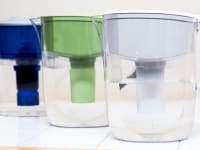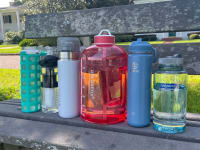Pur vs. Brita—which water filter pitcher is better?
The battle of the water filtration giants
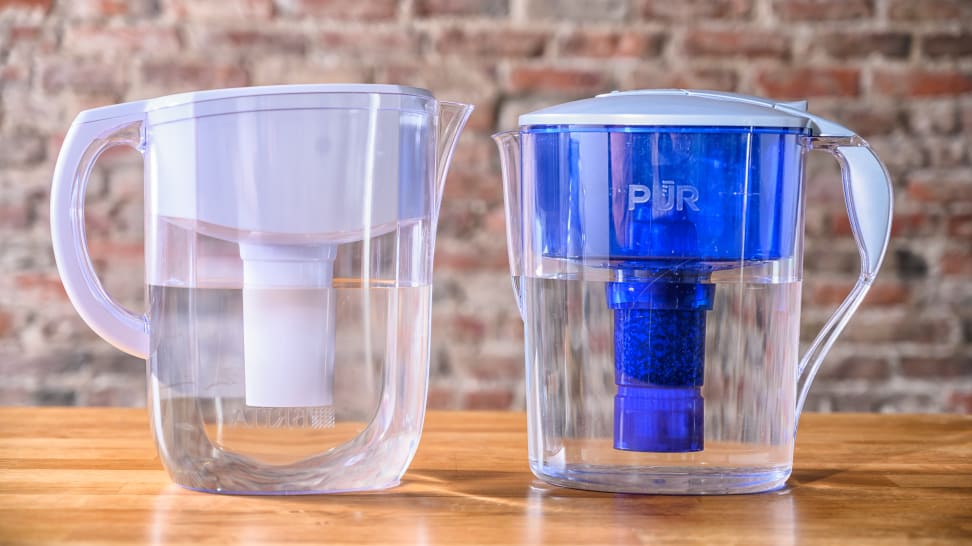 Credit:
Reviewed. / Betsey Goldwasser
Credit:
Reviewed. / Betsey Goldwasser
Products are chosen independently by our editors. Purchases made through our links may earn us a commission.
In the past few years, there has been a consistent conversation about drinking water quality. It’s no surprise that an increasing number of people are becoming proactive about the quality of their drinking water. For many budget-conscious households, that means weighing the cost and performance of popular filtration brands like PUR and Brita. These two dominate the shelf space, but understanding which offers better value depends on more than just name recognition.
To address these concerns, some people buy bottled water, while others choose to install under-sink water filtration systems.
For those who want to cut back on grocery store runs and don’t want to drop a lot of cash on major kitchen alterations, the happy medium is water filter pitchers.
With water filter pitchers, simply fill the pitcher with tap water, let it filter, and voilà, you have filtered drinking water. If you walk down the aisle of a grocery store, chances are you’ll only see water filter pitcher models made by PUR or Brita.
So, what’s the difference between these two types of water filter pitchers? After weeks of testing, we found that the PUR and Brita filtered pitchers took our top four spots. We compared the pros and cons of PUR vs Brita with respect to the following:
- Contaminants reduced
- Water taste
- Upfront cost
- Filter lifespan
- Filter replacement costs
- Pitcher quality
- Which brand is the winner?
Contaminants reduced
Advantage: PUR
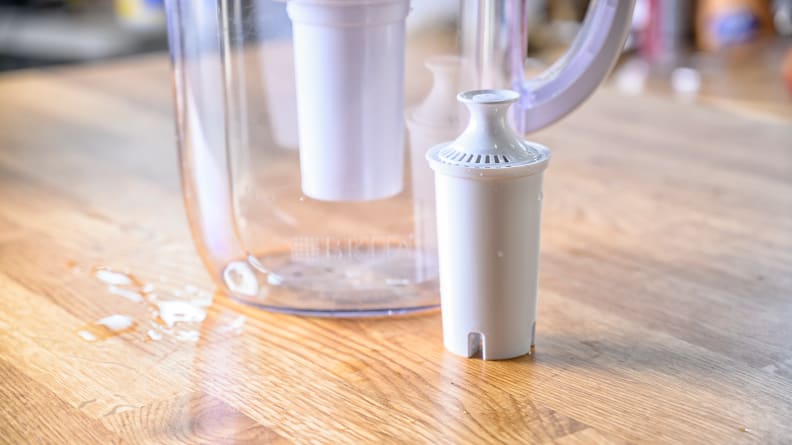
The Brita Standard filter can remove or reduce contaminants like chlorine and heavy metals (excluding lead).
For most Brita pitchers, there are two types of filters you can buy: Standard and Elite. The Standard filter primarily removes chlorine and heavy metals, such as cadmium, mercury, and copper. The Elite filter is rated to reduce chlorine, lead, and other heavy metals.
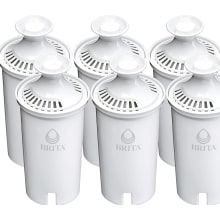
Brita's Standard filters remove chlorine and heavy metals.
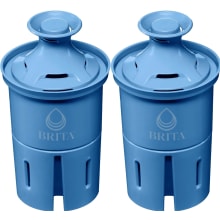
Brita's Elite filters remove triple the contaminants from standard filters, including lead.
Most PUR pitcher filters also come in two styles: Basic and PUR Plus. The Basic filter is rated to remove or reduce chlorine, heavy metals, particulates, some industrial pollutants, microbial cysts, certain pesticides and herbicides, specific pharmaceuticals, and certain industrial chemicals. The PUR Plus filter can reduce all the same contaminants as the Basic, and also removes lead. Water passes through the filter, removing harsh metals and other impurities.
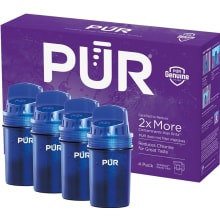
PUR standard filters work to remove or reduce chlorine, heavy metals, some pesticides and herbicides, some pharmaceuticals, and more.
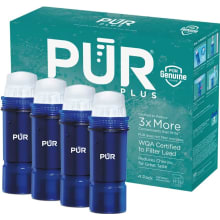
The PUR Plus filters reduce all the contaminants of standard PUR filters, plus lead.
While both brands offer a basic filter that removes or reduces chlorine and heavy metals, as well as a more expensive filter that removes lead, the PUR filters combat a wider variety of contaminants than the Brita filters.
Water taste
Advantage: Brita
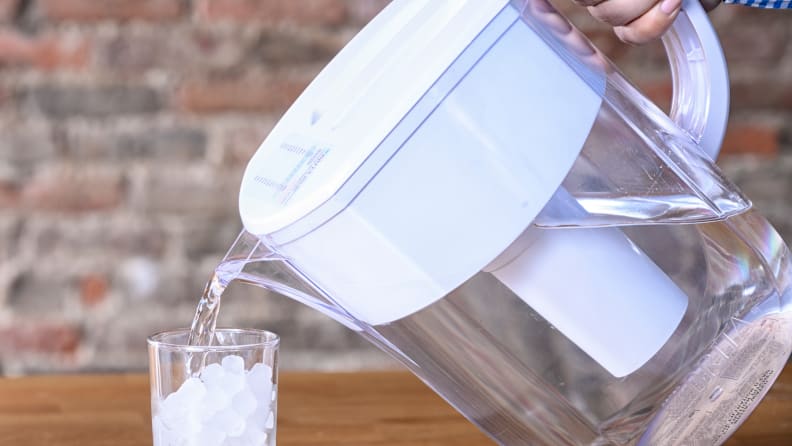
The Brita Everyday 10-cup pitcher is one of the most popular and most basic Brita pitchers.
During extensive testing, we found that, overall, people prefer the taste of tap water filtered with the Brita Standard filter more than that of water filtered with the PUR Basic filter.
Which filter provides the best-tasting water? Taste test participants described Brita water as “most clean," “tasted pure," and “most neutral." However, the Brita water didn’t win in a landslide. The PUR water was a close second, and testers commented that it tasted “clean and refreshing” and had “no aftertaste.”
Upfront cost
Advantage: PUR
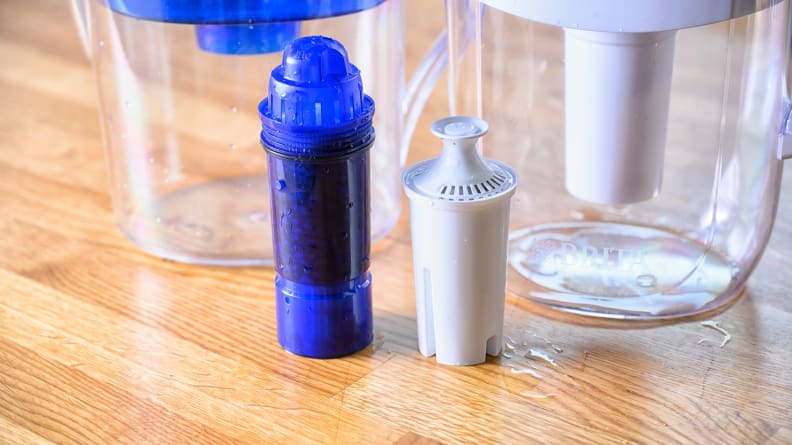
The Brita Standard and Pur Standard filters come standard with the Brita Everyday 10-cup pitcher and the Pur Classic 11-cup pitcher, respectively.
For both Brita and PUR, we tested the most basic pitcher and the model one step up from it. For Brita, these pitchers were the Everyday 10-cup pitcher and the Grand 10-cup pitcher, respectively; for PUR, these pitchers were the Classic 7-cup pitcher and the Plus 11-cup pitcher, respectively.
The two basic pitchers, the Brita Everyday and the PUR Classic, generally cost between $15 and $30. They both include a standard filter with purchase, so there’s no cost difference there.
However, there is a cost difference between the more advanced pitchers, the Brita Grand and the PUR Ultimate. The Brita Grand pitcher has a retail price ranging from $25 to $40 and includes a Brita Standard filter. The PUR Ultimate pitcher retails for $30 to $35 and includes a PUR Plus filter. This filter is the more expensive of the two PUR filters we tested.
While these pitchers all generally cost the same, you get more bang for your buck with a PUR Plus filter. This is because the PUR Plus filter that comes standard with that pitcher doesn’t increase the overall price of the pitcher. PUR and Brita also offer large-capacity dispensers designed for families or shared households. The PUR has a 30-cup capacity, and the Brita UltraMax holds up to 27 cups. PUR’s added capacity may be more convenient for larger households.

This BPA-free Brita filter is ideal for single users or smaller households, thanks to its space-efficient design. However, it doesn't compromise on your water's taste or quality.

This is yet another effective water filter from Brita, offering up to 10 cups of clean, delicious water each day.

This PUR water filter pitcher holds up to seven cups of clean, filtered water, thanks to its two-in-one water filtration system.

Another option from PUR, this water filter pitcher holds up to 11 cups of water, plus a genuine PUR PLUS Filter with advanced 3-in-1 filtration technology and WQA certification to reduce lead.
Filter lifespan
Advantage: Brita

The Pur Standard filter filters water into the Pur Classic 11-cup pitcher.
Both the PUR and Brita standard filters have a lifetime of 40 gallons of water filtered or 2 months, whichever comes first, depending on the usage.
Here’s where Brita shines. The Elite filter has a filter life of 120 gallons of water filtered or 6 months. The PUR Plus filter has a shorter lifespan than its Standard filter, lasting only 30 gallons of water filtered over 2 months. That’s to be expected, as the more intense filtration required to remove the aforementioned contaminants will necessitate more frequent replacements to maintain the same high level of water purity.
That’s what makes the Brita Elite filter such a nice surprise. You get high-quality filtration without having to replace the filter every couple of months.
Filter replacement costs
Advantage: Brita
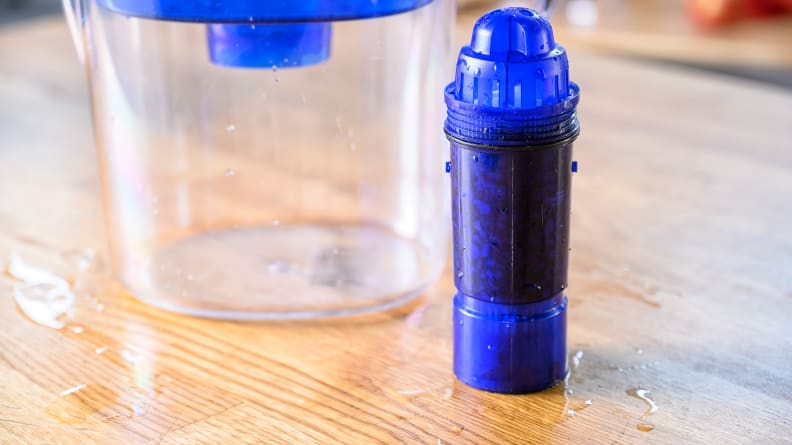
The Pur Standard filter can remove or reduce contaminants like chlorine, heavy metals (excluding lead), industrial chemicals and pharmaceuticals.
In our water pitcher roundup, we determined the cost per filter by dividing the price of a multi-pack of replacement filters by the number of filters included in that multi-pack. By our calculations, the cost per filter is:
- Brita Standard filter: $4.17/filter
- Brita Elite filter: $16.50/filter
- PUR Basic filter: $6.00/filter
- PUR Plus filter: $8.33/filter
At first glance, the Brita Standard filter appears to be less expensive than the PUR Standard filter; however, the Brita Elite filter is more expensive than the PUR Plus filter. We considered the number of times you’d need to replace each filter in a year, based on the stated filter lifespan. This accounts for countless glasses of water.
- Brita Standard filter: $4.17/filter x every 2 months for a year = $25.02
- Brita Elite filter: $16.50/filter x every 6 months for a year = $33.00
- PUR Standard filter: $6.00/filter x every 2 months for a year = $36.00
- PUR Lead Reduction filter: $8.33/filter x every 2 months for a year = $49.98
On a yearly basis, you’ll pay less for the Brita filters than you will for a PUR filter.
Pitcher quality
Advantage: Neither
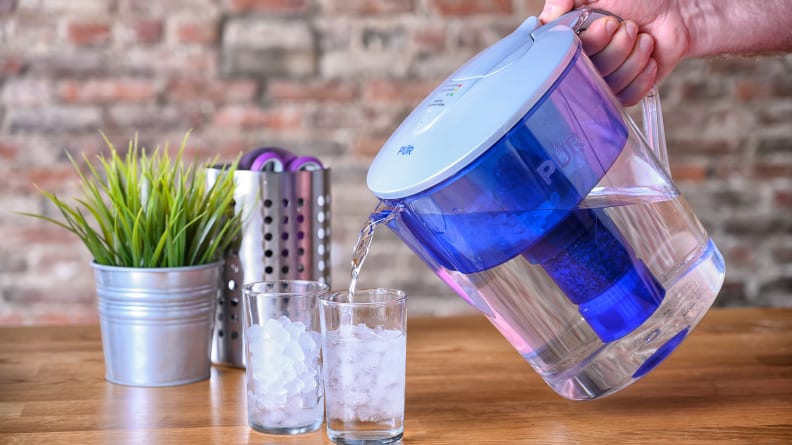
The Pur Classic 11-cup pitcher is one of the most popular and most basic Pur pitchers.
Between the Brita Everyday and Grand pitchers, and the PUR Classic and Ultimate pitchers, we found that, barring a few minor differences, the experience of using these pitchers on a day-to-day basis is similar.
While the PUR pitchers had a slightly larger capacity than the Brita pitchers (11 cups vs. 10 cups) and were easier to disassemble, the Brita pitchers had more secure lids and felt less top-heavy when filled with water.
To determine which type of pitcher is best for you and your kitchen situation, we recommend trying one out if possible. This way, you can get a feel for its weight, required fridge space, and likelihood to spill.
Which brand is the winner?
Overall winner: Brita

The Brita Everyday 10-cup pitcher and the Pur Classic 11-cup pitcher.
Considering all these criteria, Brita emerges as the top choice. Brita surpasses PUR in overall water taste, filter lifespan, filter replacement cost, and pitcher options. Brita pitchers are also more compatible with off-brand filters from companies like FilterLogic and Great Value, which also tend to be cheaper than branded replacements.
Contaminant removal winner: PUR
However, the whole point of a water filter pitcher is to remove contaminants. The PUR filters reduce and remove more chemicals from the water than the Brita pitchers do.
If you don’t have strong feelings about exactly what needs to be filtered out of your tap water, then we recommend one of the many Brita pitchers. If you have specific concerns about water contamination, PUR water filter pitchers will give you peace of mind.
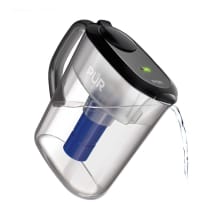
All in all, PUR filters reduce and remove more chemicals from the water than the Brita pitchers do.
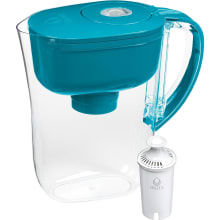
Brita surpasses PUR in overall water taste, filter lifespan, filter replacement cost, and pitcher options.


